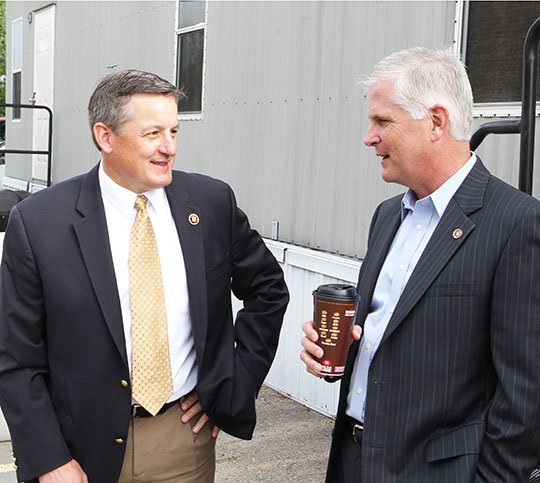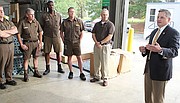U.S. Rep. Bruce Westerman, R-District 4, said Wednesday that federal highway trust fund money returned to states should be exempt from local and state sales taxes so that all of the money can be used for asphalt and concrete.
"When the federal government sends money back to the state to do transportation projects, the equipment and materials used in those projects get charged sales tax, so part of those federal tax dollars are going into state and local tax coffers, instead of into asphalt and concrete," Westerman said while visiting the UPS distribution center in Hot Springs.
Westerman said he thinks such an exemption would save $1 billion to $2 billion a year in money that could be used on highway projects.
He said about 2 percent to 3 percent of the money the federal government returns to Arkansas ends up in state and local tax coffers.
"There will be a lot of pushback from state and local governments because they like getting the sales tax revenue, but I don't think we should tax tax dollars twice. I think that money should go into asphalt and concrete, bridges, and things that make our infrastructure better," he said.
He also said the federal transportation bill will likely be reauthorized in June "to get us to the end of the year."
"But I'm not sure what the details and specifics of that will be. I think there will be some long-term funding solutions put in place and I hope to be part of the discussion on that. I've been working on it through the budget committee and have some ideas and additional bills I'm drafting on top of the one to exempt highway trust fund money from state and local sales taxes," he said.
Westerman also pointed out that many highway projects are funded through bond issues, so cities are not only paying the sales tax but financing the bonds over 20 years and paying interest charges on the original sales tax along with the new sales tax.
While speaking with UPS employees, Westerman said the highway trust fund is very important not only to UPS but commerce around the country, because it is the fund that "paves the roads and provides infrastructure and transportation that is obviously extremely important to UPS."
"We need about $12 billion to $15 billion in that trust fund to keep it sustainable," he said.
Westerman said that sounds like a lot of money, and is a lot of money, until one looks at how much the government is being grown through various social welfare programs that are increasing at more than $100 billion a year -- a rate he said is unsustainable.
"I'm working hard to try to find funds for the highway trust fund, and carry that on to the budget committee. I think it will be a top priority to get that funded for the long term. I think those are things the taxpayers expect their dollars to go to. It doesn't just affect roads, but state rail systems and transportation on navigable waterways.
"This is something I think we need to prioritize and put more emphasis on so you can do your job more efficiently, help your equipment last longer, provide less congestion as we travel, and make it more cost competitive for everyday consumers who order stuff that is delivered through UPS, and all the many ways transportation and commerce is used," he said.
In an interview with The Sentinel-Record, Westerman also commented on Arkansas House Bill 1228, patterned after the federal Religious Freedom Restoration Act of 1993, which Gov. Asa Hutchinson asked legislators to recall Wednesday. He noted that the federal law was enacted under former President Bill Clinton and "had huge bipartisan support in Congress."
"The law was challenged in court in 1997 and the court said each state has to pass it. I think 31 states have already passed it," he said.
Indiana's governor recently signed legislation enacting the measure and Hutchinson was expected to sign HB1228, which has been approved by both chambers of the Legislature, but on Wednesday he asked legislators to amend the bill to better reflect the terms of the federal act.
"There is a huge uproar about this, and I'm not sure why. I think it was a good thing when it was passed in the 1990s and I don't see where it's been abused anywhere that states have approved it. I don't see what the big issue is with it," Westerman said.
Local on 04/02/2015

